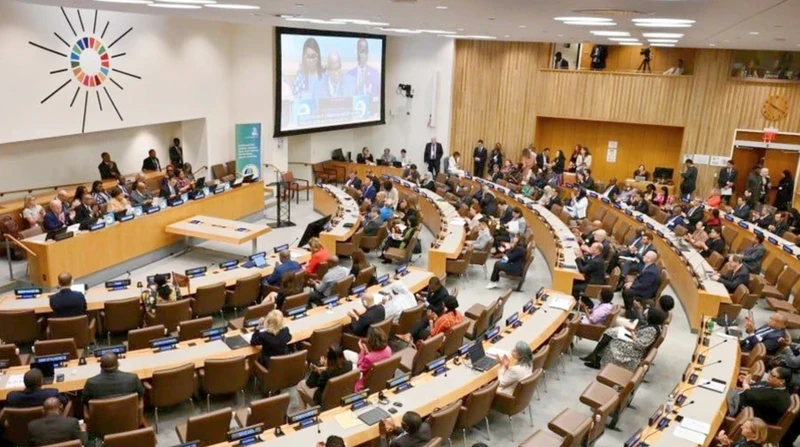The World Health Organization (WHO) announced a new financial mechanism to mobilise operating funds. In the context of increasing global health challenges in both frequency and severity, the need to ensure financial resources for the WHO’s activities has become more urgent than ever.
 |
| Countries discuss global health issues. (Photo NST.COM.MY) |
To limit financial uncertainty, the WHO recently announced a change in fundraising methods. Accordingly, the new financial mechanism called “Investment Round” will help the WHO mobilise more stable and flexible financial resources for the 2025-2028 period. WHO Director-General Tedros Adhanom Ghebreyesus affirmed, that with a sustainable budget, the WHO can focus on implementing health projects or responding to disease outbreaks, instead of wasting time raising funds for operations.
The new mechanism received strong support immediately after being announced. The European Union (EU) said it will contribute more than 250 million EUR to the “Investment Round”. Brazil announced that it would host the “Investment Round” in November, as the presidency of G20, to mobilise contributions from donors. Singapore, Qatar, France, Germany, Norway, Ireland, and others also affirmed their support for the WHO, in building a more stable and flexible operating fund.
Norwegian Minister of Health Jan Christian Vestre emphasised, that implementing the new financial mechanism is an important step, supporting the WHO’s efforts to protect people’s health.
Finance is always a difficult problem for the WHO. The operating budget of this organisation mainly comes from voluntary contributions and fixed contributions. Fixed contributions are membership fees from 194 countries, calculated based on each country’s population size and wealth. It only accounts for less than one-fifth of the total operating budget, but this is a financial amount that the WHO can use flexibly. Meanwhile, although it accounts for 80% of the WHO’s budget revenue, voluntary contributions are not sustainable, due to their dependence on donors. In addition, this fund is allocated with specific conditions from donors regarding the purpose, time, and location of fund use.
This situation makes it difficult for the WHO to maintain a sustainable financial foundation to proactively respond to global health crises. The Director General of the WHO admitted that during the COVID-19 outbreak, the organisation encountered enormous hardship in finding voluntary funding from countries to respond to the pandemic.
The most difficult period of the pandemic was over, but challenges for the WHO still exist. The organisation still has to respond to an increasing number of emergencies, from conflicts and natural disasters to infectious epidemics. A report recently published by an independent monitoring committee showed that in 2023 alone, the WHO’s emergency response unit had to mobilise resources to handle 72 emergencies, including earthquakes in Turkey and Syria, conflicts in Sudan, Ukraine and the Gaza Strip, as well as a large-scale global cholera outbreak.
Although many issues need to be resolved immediately, the WHO’s emergency response unit faces the risk of running out of financial resources to handle the crisis and maintain operations. Ghebreyesus admitted that due to financial constraints, the WHO even had to sign short-term contracts with many employees. Analysts say that when the world faces numerous emergencies simultaneously, the WHO’s financial and human resource gaps become more apparent.
The WHO’s leading role in handling global health crises cannot be denied. In the past five years, with the efforts of the WHO and member countries, 1.2 billion people have lived healthier lives, thanks to a healthy living environment, an additional 430 million people have access to essential health services, and 600 million people are better protected. The WHO also stood side by side with countries to overcome the most turbulent period of the COVID-19 pandemic.
Sustainable and flexible financial resources are the most important factor in helping the WHO carry out its mission while continuing to affirm its central role in solving global health challenges.
According to nhandan.vn








Thông tin bạn đọc
Đóng Lưu thông tin